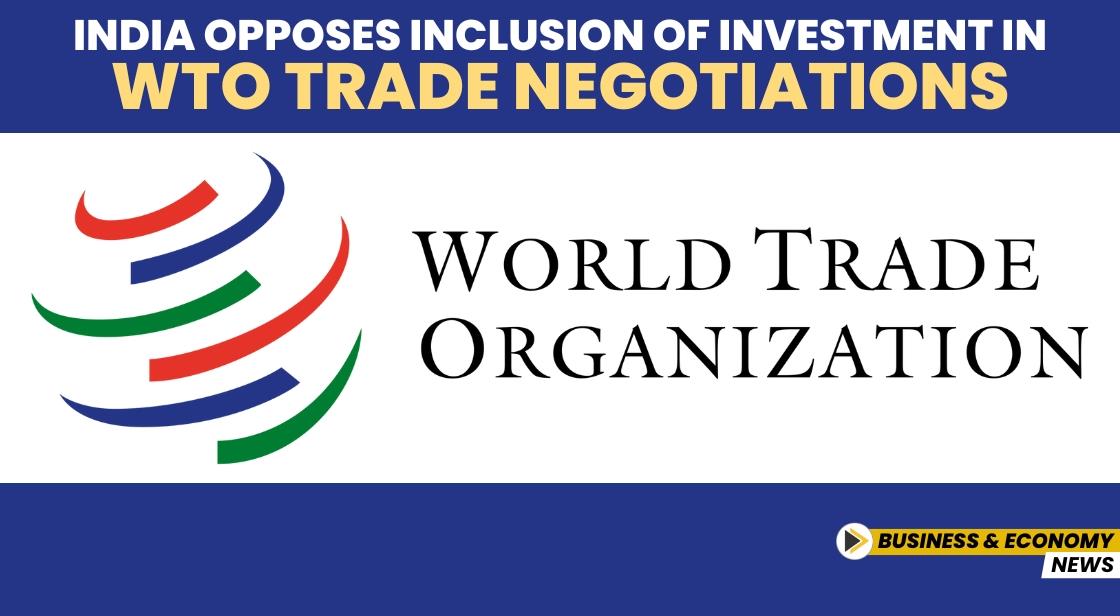India Opposes Inclusion of Investment in WTO Trade Negotiations

News Synopsis
India has strongly objected to the proposal for an Investment Facilitation for Development (IFD) agreement under the World Trade Organization (WTO) framework, asserting that investment matters should not be part of trade negotiations.
The proposal is backed by 128 out of 166 WTO members, aiming to set global benchmarks for improving the investment climate and simplifying business operations, according to the WTO website.
India has firmly opposed the Investment Facilitation for Development (IFD) agreement, highlighting concerns over its potential impact on the policy autonomy of developing nations. According to India, such agreements could expose vulnerable economies to risks if they lack the institutional capacity to safeguard their interests.
The IFD agreement, as per the WTO website, aims to establish global benchmarks to improve the investment and business climate. It seeks to make it easier for investors to initiate projects, conduct operations, and expand businesses across sectors. However, India believes the agreement may disproportionately benefit developed nations and powerful economies, undermining the interests of less developed countries.
Global Reactions to the IFD Proposal
A significant majority—128 out of 166 WTO members—support the IFD initiative. Reports indicate that China has played a pivotal role in rallying support for the agreement, with Pakistan being the latest nation to back it at the recent General Council (GC) meeting.
While the United States has neither endorsed nor opposed the proposal, India, South Africa, Namibia, and Türkiye remain vocal in their resistance. India asserts that "investment isn't a part of trade and hence can't form part of trade negotiations" and insists that any adoption of the IFD requires unanimous consensus among WTO members.
India’s Efforts to Build Consensus
To strengthen its stance, India has engaged in bilateral discussions with countries like Indonesia, referencing concerns raised by Indonesia itself about the IFD agreement in earlier discussions. At the 13th WTO Ministerial Conference in Abu Dhabi, India presented written objections to the WTO Secretariat, clearly outlining its reservations.
India’s Commerce and Industry Minister Piyush Goyal reiterated that issues beyond the WTO’s trade mandate should be addressed by their respective regulatory bodies. Goyal urged the WTO to prioritize rebuilding trust among member nations by focusing on its core mandates and reviving the organization’s defunct dispute resolution mechanism.
Broader Implications for Global Trade
India also flagged concerns about "trade protectionism in the garb of sustainability." Referring to contentious policies like the carbon tax, Indian officials indicated that such measures could negatively affect countries dependent on conventional energy sources.
The IFD debate underscores the growing tension between preserving national policy autonomy and adhering to global trade standards. While the IFD aims to create a conducive environment for investments, India’s concerns highlight the risks of diluting regulatory sovereignty in the face of global economic pressures.
About World Trade Organization (WTO)
The World Trade Organization (WTO) is an intergovernmental organization established to regulate international trade between nations. Headquartered in Geneva, Switzerland, the WTO serves as a global platform to ensure that trade flows smoothly, predictably, and freely while fostering economic growth and development.
Key Facts about the WTO
-
Founded: January 1, 1995
-
The WTO replaced the General Agreement on Tariffs and Trade (GATT), which had been in operation since 1948.
-
-
Members:
-
As of 2024, the WTO comprises 164 member states and 24 observer nations working towards full membership.
-
-
Primary Objective:
-
To promote free and fair trade by reducing trade barriers such as tariffs, subsidies, and import quotas.
-
-
Decision-Making Process:
-
Decisions are made through a consensus-based approach among all member states, with equal voting rights regardless of a country’s size or economic power.
-
Functions of the WTO
-
Trade Negotiations:
-
Provides a forum for member countries to negotiate trade agreements aimed at liberalizing global trade.
-
-
Dispute Resolution:
-
Manages a structured mechanism for resolving trade disputes between nations to ensure compliance with trade rules.
-
-
Monitoring and Policy Review:
-
Regularly reviews trade policies of member countries to ensure transparency and consistency with WTO agreements.
-
-
Capacity Building:
-
Offers technical assistance and training to developing and least-developed countries to enhance their trade capabilities.
-
Key Agreements Under WTO
-
GATT: General Agreement on Tariffs and Trade (focuses on goods).
-
GATS: General Agreement on Trade in Services (regulates services).
-
TRIPS: Agreement on Trade-Related Aspects of Intellectual Property Rights.
Significance of the WTO
-
Global Trade Stability:
-
Acts as a safeguard against protectionism by encouraging open markets and fair competition.
-
-
Economic Growth:
-
Facilitates trade policies that boost global economic development, particularly for developing countries.
-
-
Legal Framework:
-
Provides a rule-based trading system, reducing uncertainties in global trade.
-
Criticisms of the WTO
-
Bias Towards Developed Nations:
-
Critics argue that the WTO disproportionately benefits advanced economies, often at the expense of developing nations.
-
-
Slow Negotiations:
-
Trade talks, such as the Doha Development Round, have faced significant delays, limiting progress.
-
-
Erosion of Sovereignty:
-
Some countries view WTO rules as infringing on their national policy autonomy, particularly on issues like subsidies and environmental standards.
-
Major Challenges Facing the WTO
-
Global Trade Disputes:
-
Escalating trade tensions between major economies, such as the US and China, pose significant challenges.
-
-
Dispute Resolution Crisis:
-
The WTO’s Appellate Body, crucial for resolving disputes, has been non-functional since 2019 due to blocked appointments by the US.
-
-
Inclusivity:
-
Ensuring that the interests of developing and least-developed countries are adequately represented in global trade policies.
-
Recent Developments
-
At the 13th Ministerial Conference in Abu Dhabi (2024), discussions focused on key issues such as investment facilitation, e-commerce, and climate-related trade policies.
-
Members emphasized the urgent need to revive the WTO’s dispute resolution mechanism to restore trust in its functions.
Quick Overview
|
Aspect |
Details |
|
Headquarters |
Geneva, Switzerland |
|
Established |
1995 |
|
Members |
164 full members, 24 observers |
|
Main Functions |
Trade negotiations, dispute resolution |
|
Key Agreements |
GATT, GATS, TRIPS |
The WTO continues to play a vital role in shaping global trade dynamics despite facing significant challenges, making its reform and revival a priority for equitable and sustainable trade practices worldwide.
You May Like









